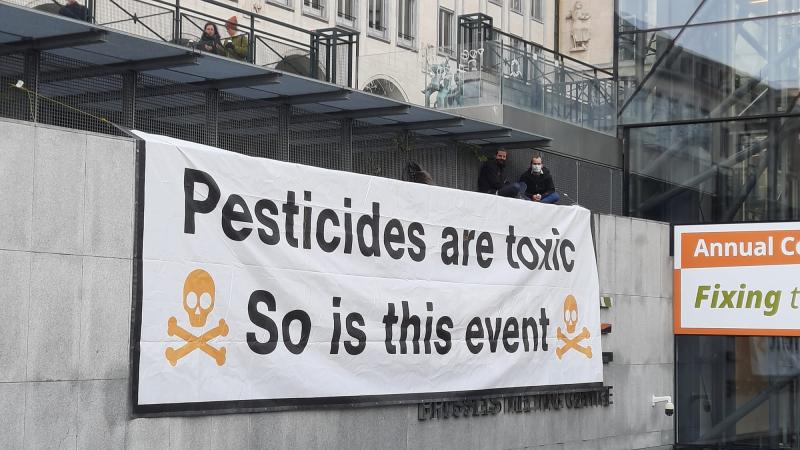Stay always informed
Interested in our articles? Get the latest information and analysis straight to your email. Sign up for our newsletter.

Most of the 116 recommendations made by special committee (PEST) and voted for by the European Parliament (1) in January 2019, which aimed to make the EU’s pesticides authorization system more transparent and efficient, have been largely ignored by the European Commission and member states, new analysis shows.
The analysis reveals that 28% of the PEST recommendations have either been only partly or insufficiently implemented. 57% of the PEST recommendations have not, or barely, been implemented. In some cases, the situation concerning the authorisation and usage of systemic pesticides got worse.
PEST was created in 2018 by the European Parliament in reaction to the Monsanto Papers, and the scientific and institutional dubious acting in the glyphosate dossier. Now, over 4 years after the PEST committee’s final report was approved, a review done by PAN Europe shows that a mere 15% of its recommendations have been implemented.
The review was announced today by a coalition of NGOs (2) in response to a follow-up conference (3) on the PEST committee in the European Parliament.
Another new briefing on ‘the impact of pesticides on human health and ecosystems’ by the European Environmental Agency (published 26/4) shows that EU-27 pesticide sales have remained at around 350,000 tonnes per year for the past decade. The EEA warns of the dramatic effects of this massive use of pesticides on human health and the environment.
The NGO-coalition has published a roadmap of ten priorities to urgently improve the way the EU deals with synthetic pesticides. This roadmap will be shared with the EU institutions (4).
The EEA also calls for the need to “improve the current risk assessment procedures, to better capture pesticide impacts at the ecosystem level and address scientific uncertainty, in line with the precautionary principle that underpins the regulation on plant protection products”.(5)
According to the EEA “widespread pesticide use is a major source of pollution contaminating water, soil and air, driving biodiversity loss, and leading to pest resistance”. And “human exposure to chemical pesticides is linked to chronic illnesses such as cancer, and heart, respiratory and neurological diseases”.
Hans van Scharen (Corporate Europe Observatory) said:
“We applaud the follow up today of the PEST Committee. But as European democracy anno 2023 is concerned, one cannot be satisfied with what has been done with the important recommendations of the PEST Committee. In some cases, the situation today is even worse than what it was in January 2019. If this shows how serious the European Commission and Member States take improvement of pesticide regulations, and also how serious they take governance and the democratic process, then one should not be surprised if citizens lose their faith in the EU. Yet if one looks at the recent attacks on the pesticide reduction proposals (SUR), it seems some EU regulators and politicians are blocking improvement.”
Andy Battentier (Secrets Toxiques) said:
“Pesticides play a part in the development of many chronic diseases - diseases which are particularly likely to impact pregnant women, children and farmers. They also contribute to the decline of biodiversity. And according to many scientists and the EEA, excessive pesticide use is likely to negatively affect food security. And all this happens while the EU regulation on pesticides demands innocuity to be proven before any authorization is granted.”
Angeliki Lysimachou (PAN Europe) said:
“Time and again, opinion polls, two successful ECI’s and the Future of Europe debate showed, that EU citizens are highly concerned about the consequences of systemic pesticides. Europe could and should be much healthier and biodiverse. This can be achieved quickly with better implementation of existing rules. Our roadmap describes 10 priorities that urgently need to be addressed to meet the level of safety required by EU regulation. The call for urgency should by now be loud enough to be ear numbing by now.”
ENDS
Notes to the editor:
● 1. Following the US litigations and publication of the Monsanto Papers and the controversy that arose around the glyphosate renewal, there were deep concerns over the transparency, the accuracy and the independence of the EU’s pesticides authorisation procedure. In February 2018, the European Parliament therefore decided to set up the Special Committee on the Union’s authorisation procedure for pesticides (PEST), with the rapporteurs MEP Bart STAES (Greens/EFA, BE) and MEP Norbert LINS (EPP, DE). After 9 months of assessing and studying EU and national pesticides authorisation procedures, question and audit experts and stakeholders, PEST presented it’s concluding report with 114 recommendations; This report got adopted in January 2019 by a large majority of MEPs and was saluted by NGOs as a significant step towards a more transparent and efficient pesticides authorization system, to improve a higher level of protection of human health, food safety and environment.
● 2. The coalition: PAN Europe, SOS Faim, Corporate Europe Observatory, Générations Futures, Nature et Progrès Belgium and Secrets Toxiques
● 3. The European Parliament is organizing a conference in the morning of April the 27th to review the implementation of PEST recommendations, with MEPs, Commission, scientists and NGOs.
● 4. The 10 points roadmap and further analysis here.
● 5. According to the EEA improving risk assessment includes, among other things:
● developing more integrated risk assessment methodologies to better assess risks to health and the environment, as currently attempted by the EFSA and the interaction of pesticides with other stressors such as climate change;
● taking into account combined exposure to mixtures of different chemicals;
● accelerating test method development to determine pesticides toxicity to pollinators, as recently proposed in the new deal for pollinators;
● improving the risk assessment of co-formulants, adjuvants and novel biopesticides;
● simplifying risk assessment procedures and moving towards generic risk assessment to reduce the risk of regrettable substitutions, in line with the chemical strategy for sustainability.